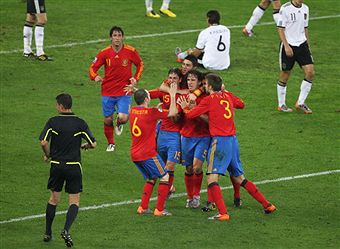So Spain versus the Netherlands it is.
And an obvious question presents itself for students of the race to host the 2018 World Cup: Is this an omen for the vote in December?
England (and Russia) must hope not.
And indeed it seems pretty far-fetched to claim a direct link between the ability to field a strong national first XI and the capacity to lay on a tip-top World Cup.
If you are looking for evidence that one is not a pre-requisite of the other, you need look no further than South Africa.
And yet, I would argue that making the most of one’s playing assets is a reasonable enough yardstick to use when assessing the calibre of a country’s football administration.
And the more effective the host-nation’s administration, the more smoothly the tournament is likely to pass off, assuming the existence of a certain critical mass of footballing, transport and tourism infrastructure.
So there is a link of sorts.
Both tomorrow;s finalists are there, it seems to me, because – just in the past two or three years – they have finally succeeded in overcoming deep-rooted flaws that have always undermined their campaigns in the past.
That, in a nutshell, is why neither country has yet won the World Cup, in spite of producing more than their fair share of talented players.
And while I am not close enough to either set-up to know what specific buttons were pressed, the elimination of what, in both cases, were deep-seated problems can hardly fail to reflect well on the quality of decision-making in the current Dutch and Spanish administrations.
In England, it is often said, successive national teams have underperformed because of the tensions stirred up by perennial “Club versus Country” disputes.
In Spain, for years and years, what appeared to be holding the national team back was more akin to a “Club versus Club” situation.
However hard they tried, players from Barcelona and Real Madrid, the country’s two leading clubs, rarely if ever seemed to bring the best out of each other when wearing the red shirts of Spain.
In recent times, for whatever reason, this debilitating conundrum looks to have been relegated to the history books.
In this week’s semi-final against Germany, a match for the connoisseur if ever there was one, a core of seven Barcelona men played mesmerising possession football under the guidance of a manager, Vicente del Bosque, who spent nearly two decades as either player or coach of Real Madrid, led by a captain, Iker Casillas, also from Real Madrid.
 Under different circumstances, you might imagine an inspirational leader such as Carles Puyol feeling miffed that the captain’s armband had not gone to him.
Under different circumstances, you might imagine an inspirational leader such as Carles Puyol feeling miffed that the captain’s armband had not gone to him.
Instead, he was a tower of strength in the Spanish rearguard, as well as hammering home the winning goal with a header of stunning power.
For the Dutch, the perennial problem was more like “Player versus player”.
Endowed with as much talent as any rival, time and again their chances seemed to founder amid stories of friction involving one group of players or another.
Another besetting “sin” was that scoring goals appeared at times to be at best third on their list of priorities, behind demonstrating total mastery over a) the ball and b) their toiling opponents.
As with the Spanish, the 2010 vintage appears to have overcome what we had come to look on as quintessentially Dutch shortcomings.
You would be pushed to argue that coach Bert van Marwijk’s squad contains no strong characters.
Yet I am not aware of serious eruptions.
Meanwhile, this Dutch team has cut back on the showboating to such an extent that “functional” has become almost a stock description.
One suspects it is usually applied with a critical edge, but, seen in its proper context, the functionality of this side is the whole point.
So there you have it: two countries who, apparently, have thought their way through intractable onfield problems that have repeatedly undermined them and who now stand on the brink of the greatest footballing achievement ever by their national sides.
Will there be FIFA Executive Committee members in the Soccer City stands on Sunday reflecting that either country might address the challenges thrown up by hosting a World Cup just as purposefully and effectively?
Maybe, maybe not.
Other factors are likely to count for more in their eventual decision.
But I am certain that the two nations’ strong showing in this first African World Cup - an undertaking which, let it be remembered, is particularly close to the heart of Sepp Blatter, the FIFA President - will not have done their 2018 prospects any harm.
David Owen is a specialist sports journalist who worked for 20 years for the Financial Times in the United States, Canada, France and the UK. He ended his FT career as sports editor after the 2006 World Cup and is now freelancing, including covering the 2008 Beijing Olympics. He will be reporting for insideworldfootball from South Africa and tweeting at www.twitter.com/dodo938
.jpg)